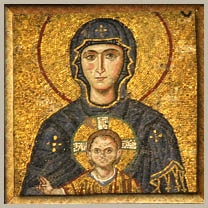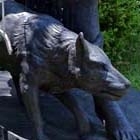Learn about the history and discover the mosaics of this monument of world architecture

Chapter XVIII
Encounter with the Soviet
Nex day, sickened morally with human wickedness and stupidity, and physically by the insupportable smell of the wine, we were all together in the gallery when" Ie Pere Myron" was announced. This was a strange old man, with a long, greyish beard and long hair, dressed in rags, who went bare-footed in summer, but who wore sandals in winter; he carried in his hand a superb ebony cross with a massive silver handle. This was his only luxury and he kept great store by it, for it was a gift from the Empress. A big and massive cross of copper, suspended from a heavy chain, shone on his breast. We had often seen him at the Znamenie church. We had noticed his fervour in prayer and his serene piety at Holy Communion. He had all the appearance of an apostle, of a saint. The Grand Duke, nevertheless, had such a feeling of repulsion for the startzy that he had a distrust even of this one. After the Revolution, one Sunday when we were at Mass, he entered in a resolute way the little chapel in which we still remained and which used to be reserved for the Imperial Family. He gave the blessed bread to all of us and placed his hand on the head of each of us, whilst offering up a prayer. Then, looking into Vladimir's eyes, he said to him these mysterious and prophetic words:
"Thou hast before thee a great road to traverse. . .. God will be with thee."
Then he disappeared, and no one of us was thinking of him when, on the day after the dreadful destruction of the wine-bottles, he appeared again, During the'eight months that had intervened his severe and noble features had become emaciated, but his eyes, blue and clear, had a peculiar brightness.
"You are unhappy," he said to me, "but you must know how to bear trials. Our life on this earth is only a very short passage. The more you suffer down here, the better you will deserve heaven hereafter. What can these people do? Has not Our Lord said: 'Fear not those that destroy the body but that cannot destroy the soul ? "
He spoke to us at length. We listened to him, feeling subdued, in silence, and he poured balm on our wounded hearts. . .. 'When going, he said to us:
"I have brought you some good milk, quite fresh. The Grand Duke has need of it."
And in truth it had just been announced to us that they would no longer give us the milk which we had been buying from the Imperial farm.
"I shall often bring you some," he added; but he went off refusing any alms and blessing us paternally.
This visit did us good. He often returned after that, and always at painful and critical moments. I believe firmly that this old man was a messenger from Heaven.
The Commandant of Tsarskoe was now young B--, a painter of talent, the same young man whom Rochall had brought with him on the day of the Grand Duke's arrest. He was a handsome youth, with rosy cheeks, white teeth and a childlike smile. One day I went to the Soviet, which held its sittings then just in front of the great palace,and, finding myself alone with him, I said:
"Look here, B--, be sensible. You are a well-educated, boy, you are well-informed, you have talent. What has induced you to get mixed up in such an adventure? Get away from here! Bolshevism is a horrible swindle. It is an ill-omened thing and will not last, I hope."
He looked at me in alarm. " You believe that? " he asked. "And if the Monarchy comes back I shall be shot?"
I smiled at his fears and said:
"If you promise to protect us now I promise, for my part, to save you from execution later."
We separated as friends, and he never caused us any annoyance - on the contrary. At this period there appeared on the scene another person who played an important role in our life during those tragic days. This was Comrade Telepneff. Appointed to the Tsarskoe Soviet, he at once acquired considerable influence in it. Half educated, with an air of bonhomie about him he was lacking neither in shrewdness nor cunning. One morning he asked to see me. One could not refuse a visit from a member of the Soviet. I asked him in, and he announced that the Soviet, being at a loss for room, had decided to transfer its goods ,and chattels into our palace.
"Comrade," I said to him. "You who are a friend of Lounatcharsky, the People's Commissary of Fine Arts, I warn you that this will be a crime, for there are marvels of art in this house which you have the intention of invading, and which will get to look like stables in a few days."
He listened to me attentively, consulting me as to what would be the best thing to do. Knowing that the palace of the Grand Duchess Vladimir, opposite ours, had already been pillaged, and that there was nothing left of it but the walls, I advised him to install his office there. He promised to bring quietly round to this decision the members of the Tsarskoe Soviet, who had taken it into their head to plant themselves on us. He promised also to speak to Lounatcharsky with a view to having our house protected, I for my part addressed myself to my old life-long friend, Alexandre Polovtsoff, who was Commissary of Fine Arts, and to whom Lounatcharsky listened devoutly. One fine day it was announced to me that M. Korovine had come to look at the house. I went out to him, and believing that he was someone from the Soviet come to see about the future installation, I asked brusquely:
" What do you want? "
Turning his hat in his fingers he said: " I have come to look at the house."
" Very well," I said. "Look at it ! "
" I have come to visit the house," he repeated.
Exasperated, I exclaimed: " You weary me, I have already told you you can visit it."
Then in the purest French he said:
"But, Princess, do please understand me. I have come to save your house. I belong to the Commission of Fine Arts; it is Alexander Alexandrovitch Polovtsoff and M. Georges Loukomsky who have sent me! "
"Why did you not say that before? " I said to him, shaking his hand.
He went through the rooms, consulting me about the finest pictures, and about my greatest treasures, and we drew up a report in which he said all that was essential, in the interest of the people, to save the house of the Citizen Paley from all possible hurt and deterioration. This young man chanced to be a friend of Telepneff, for they had served in the same regiment during the war. M. Georges Loukomsky, a watercolourist of great talent, and custodian of the palace, was also a member of the Fine Arts Commission for the Tsarkoe palaces, He came to see me, and promised me his help and support.
Nevertheless the Tsarskoe Soviet, spurred on by Gueorguenberguer who had become our mortal enemy, did not give up their idea of installing themselves in our house. Word was sent me that a commission from the Soviet would come and visit the palace. I prepared docilely for this new ordeal. First the President of the Soviet arrived, and then Telepneff, Gueorguenberguer, and five or six others all dressed in khaki, with high boots and fur caps (papachis). Evidently they were expecting someone else. After a certain time there arrived a chubby-faced little bonhomme, with a little pointed beard, his fur cap thrown back on his head, and crushed in in the middle. Knotting his brows in order to give himself a ferocious aspect, he made a circular salute to all those assembled, but I noticed that he avoided meeting my eyes. "Where have I seen that head before? " I asked myself, and the more I puzzled the more convinced I felt that I knew this man who was giving himself such airs of importance. From what they were saying I gathered that he was Architect to the Soviet. We went through the house, from the basement to the third floor and, coming to the part in which we had formerly planned to construct a chapel, one of the men turned towards the architect and said to him:
"Wassili Ivanovitch, we ought to see the plans of the house."
A sudden flash tore away the veil from my torpid memory.
"But," said I, in self-possessed tones, " Wassili Ivanovitch Chodoff has no need of plans, he knows the house perfectly" When he came in with his fur cap and his cigarette, I did not recognise in this fierce Revolutionary the modest little architect whom Prince Michael Pontiatine brought along to construct a chapel here, In those days he scarcely dared to look at me, he walked on the tips of his toes, and he kissed my hand with devotion. . . "
My audience listened open-mouthed! I saw the little man grow pale! His ears had become white. He began to cough and said:
"Comrades, decidedly this house does not suit us. I think we should do better in the house opposite."
And he carried off all the others at once. Telepneff went off into roars of laughter, while Gueorguenberguer threw furious glances at me.





